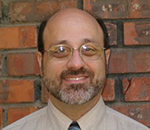MUS 695: Thesis Guidance
Rob Amchin, Ph.D.

Dr. Amchin incorporates Intellectual Standards of the Paul-Elder Critical Thinking Framework into his MUS 695 Thesis course.
For this course, Amchin says he has taken a more systematic approach than in previous years. The focus is specifically on the thesis assignment in which his students read and reflect on existing music teaching and learning (and other related fields) research. This information is then applied to students’ theses projects. Using critical thinking is helping his students "organize their thoughts and findings in authentic ways rather than disorganized ways," according to Amchin. He anticipates this detailed outlining of the assignment will give students more direction in their thinking and although them to better focus on compiling their findings into a "cohesive whole".
I love the concept of critical thinking. It is one of the underpinnings of what I do in all of my classes.
"Everything that I do with my students requires critical thinking," says Amchin. "As a teacher educator, I am constantly focusing students on their abilities to look at given data, reflect on its relevance and appropriateness to their roles as teachers and their understandings (preconceptions and beliefs) about music instruction and learning. In course assignments such as these, students have an opportunity to organize their thinking to go beyond the basic information given to them in an article, or class experience, and apply these activities to active and authentic reflection on the relevance and appropriateness of what others think about teaching and learning (in music)."
View Dr. Amchin’s MUS 695 Thesis Assignment [PDF] with infused Paul Elder framework concepts.
Amchin is currently redesigning another class for the fall of 2012 to incorporate a strong focus on critical thinking.
